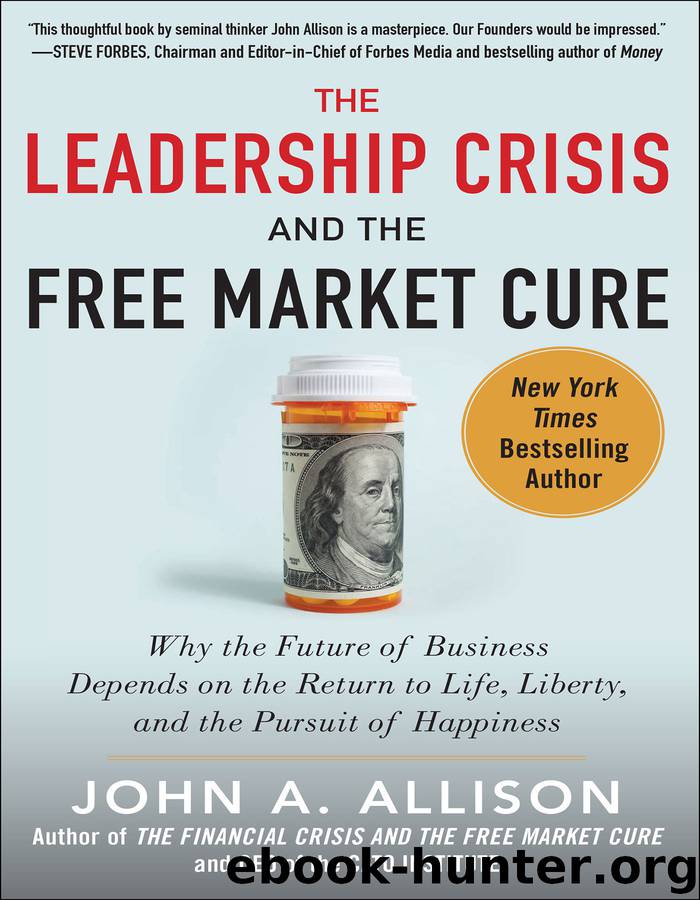The Leadership Crisis and the Free Market Cure by John A. Allison

Author:John A. Allison
Language: eng
Format: epub
Publisher: McGraw-Hill Education LLC
Published: 2015-03-09T16:00:00+00:00
Leading for Personal, Organizational, and Societal Greatness
The Role of Emotions
WHEN ONE HIGHLIGHTS RATIONALITY, IT IS OFTEN ASSUMED THAT emotions are not important. There is supposed to be a conflict between reason and emotion. In fact, emotions are very important, and there is not a fundamental conflict between reason and emotion.
To be a successful leader you need passion, enthusiasm, and energy. Who wants to follow a passionless, dull, unenergetic leader? Properly aligned emotions can give you intensity and focus and can create resourcefulness. A sense of moral certainty is communicable to others and often energizes their efforts. This is one more reason why it is important to have a set of values that is consistent with life on this earth and one with the other and to act with integrity in accordance with these principles.
Emotions are important, but the nature of emotions and their proper role is often misunderstood. There are some commonsense observations about emotions that are supported by everyday human behavior. Emotions in many ways are similar to primitive values. They are automated subconscious responses mostly developed early in life. Although your emotions evolve throughout your life, the most powerful ones are typically developed when you are young in relation to your parents or early caregivers. But many events in your life can shape your emotions.
For example, perhaps early in your development you met someone you liked and later you met someone else who resembled the original person you liked, and you decided to like that type of person. Or perhaps you did something you did not like and later you did something similar to the event you initially did not like, and you decided you would not like this type of event.
Remember the discussion of concept formation in Chapter 4. You were effectively developing emotional concepts: likes, dislikes, maybes. These emotional concepts were placed in your subconscious and often create automated responses to people and events independent of rational analysis.
It is probable that each of us is born with some emotional propensities. These are tendencies to learn certain emotional lessons from life experiences based on genetic characteristics. However, we do learn our emotions (within the context of these tendencies). This is self-evident in that every individual has a different set of emotions. If our emotions were hardwired genetically, we all would have basically the same emotions because there would be a set of emotions that would improve our ability to survive and perpetuate the species.
If you have multiple children, it is typically observable that from an early age they tend to interpret emotional activities differently, probably reflecting some innate emotional characteristics. Yet you can observe their emotions evolving over time, reflecting the fact that some critical aspects of emotions are learned.
The good news is if you are reading this book it is likely that most of your emotional reactions are helpful. One would not want to have the emotional attributes of the typical criminal. Although your overall emotions may be helpful, I have never met anyone who had perfectly reliable emotions.
Download
This site does not store any files on its server. We only index and link to content provided by other sites. Please contact the content providers to delete copyright contents if any and email us, we'll remove relevant links or contents immediately.
Bad Blood by John Carreyrou(6606)
Rich Dad Poor Dad by Robert T. Kiyosaki(6586)
Principles: Life and Work by Ray Dalio(6394)
Playing to Win_ How Strategy Really Works by A.G. Lafley & Roger L. Martin(6198)
Management Strategies for the Cloud Revolution: How Cloud Computing Is Transforming Business and Why You Can't Afford to Be Left Behind by Charles Babcock(4562)
The Confidence Code by Katty Kay(4241)
Thinking in Bets by Annie Duke(4210)
American Kingpin by Nick Bilton(3864)
Delivering Happiness by Tony Hsieh(3408)
Project Animal Farm: An Accidental Journey into the Secret World of Farming and the Truth About Our Food by Sonia Faruqi(3208)
The Power of Habit by Charles Duhigg(3118)
The Tyranny of Metrics by Jerry Z. Muller(3055)
Brotopia by Emily Chang(3045)
The Marketing Plan Handbook: Develop Big-Picture Marketing Plans for Pennies on the Dollar by Robert W. Bly(3033)
Mastering Bitcoin: Programming the Open Blockchain by Andreas M. Antonopoulos(3032)
I Live in the Future & Here's How It Works by Nick Bilton(2977)
The Content Trap by Bharat Anand(2912)
Applied Empathy by Michael Ventura(2884)
Building a StoryBrand by Donald Miller(2883)
